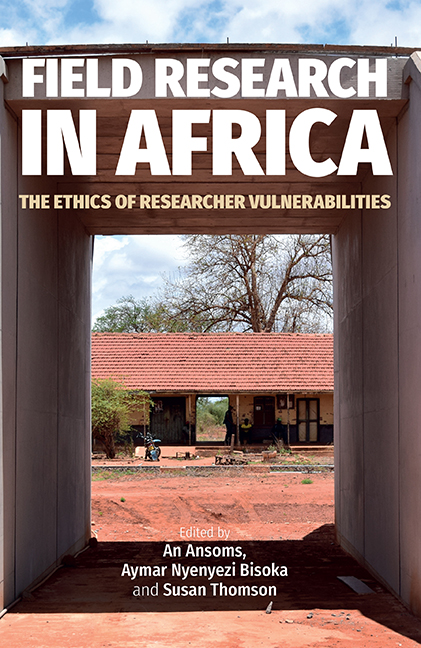Book contents
- Frontmatter
- Contents
- List of Contributors
- Foreword: It is about Us
- Map of Africa showing Fields of Research
- Introduction: Fields of Vision, Emotion as Reflexivity
- 1 Skin Connections: Negotiating Institutional Ethics alongside Insider Identities
- 2 Conducting Sensitive Research ‘At Home’: A Matter of Responsibility
- 3 A Gendered Research Journey: Ethical Dilemmas of an Algerian Immigrant Recovering the Memory of ‘Home'
- 4 Establishing Kinship in the Diaspora: Conducting Research among Fellow Congolese Immigrants of Cape Town
- 5 ‘If they find out, we're dead': Intermediaries, Self-censorship, and Anxiety in Research as an Outsider-Insider
- 6 Looking Behind the Screen: Ethical Quagmires when Accessing Hidden Discourses
- 7 Scholar-Activist? On Relational Accountability and an Ethic of Dissemination
- Conclusion: Theorising Self as Ethical Research Practice
- Bibliography
- Index
5 - ‘If they find out, we're dead': Intermediaries, Self-censorship, and Anxiety in Research as an Outsider-Insider
Published online by Cambridge University Press: 10 June 2021
- Frontmatter
- Contents
- List of Contributors
- Foreword: It is about Us
- Map of Africa showing Fields of Research
- Introduction: Fields of Vision, Emotion as Reflexivity
- 1 Skin Connections: Negotiating Institutional Ethics alongside Insider Identities
- 2 Conducting Sensitive Research ‘At Home’: A Matter of Responsibility
- 3 A Gendered Research Journey: Ethical Dilemmas of an Algerian Immigrant Recovering the Memory of ‘Home'
- 4 Establishing Kinship in the Diaspora: Conducting Research among Fellow Congolese Immigrants of Cape Town
- 5 ‘If they find out, we're dead': Intermediaries, Self-censorship, and Anxiety in Research as an Outsider-Insider
- 6 Looking Behind the Screen: Ethical Quagmires when Accessing Hidden Discourses
- 7 Scholar-Activist? On Relational Accountability and an Ethic of Dissemination
- Conclusion: Theorising Self as Ethical Research Practice
- Bibliography
- Index
Summary
SUMMER 2012. I’M in a bicycle taxi in Cibitoke, one of the eighteen provinces of Burundi. It is my first trip as a part of my doctoral research, but in a location I already know. This was the same road as the one I took ten years before, a road connecting Bukavu city in eastern Democratic Republic of Congo (DRC) with Bujumbura, the capital of Burundi, via the Rwandan town of Bugarama. At that time, I was working in the development cooperation sector in these three countries. I did not yet know that these countries would later become the site of my doctoral research.
During my travels, I often found joy in admiring the meanderings of the Ruzizi River. I scanned the strips of land that stretched roughly towards the only point of intersection between Burundi, Rwanda, and the DRC. I admired this scenery whenever I visited Cibitoke. Each time, I would look at this wonderful landscape, whose glistening beauty would, paradoxically, fade into darkness as my bicycle taxi drove further away, leaving my mind to dwell on the memories of the sombre and murderous past of this part of Central Africa. Once again, that day, I realised how difficult it was for residents of this region to free themselves of the ancient scars of the past.
As we drove on this particular day, my taxi driver and I came nearer to a crowd of young people who were listening to a small object they were gathered around. It was midday. Everyone was lis-tening to the news on the radio, as was the custom in this country. They were listening to Radio Publique Africaine, the African Public Radio, a private station that armed forces loyal to the Burundian government destroyed, in May 2015, during an attempted coup. I strained my ears, joining the rest of the crowd. The radio announced that, a mere kilometre away from where we were standing, several corpses, some tied up and others crammed into bags, had just been discovered floating in the river on the border of Rwanda and Burundi. The announcement launched the beginning of political disputes between the secret services of both countries.
Three years later, in 2015, as I was starting the last phase of my PhD fieldwork, young men known as Imbonerakure – a militia of the governing party of Burundi based in eastern DRC – decided to return home.
- Type
- Chapter
- Information
- Field Research in AfricaThe Ethics of Researcher Vulnerabilities, pp. 85 - 104Publisher: Boydell & BrewerPrint publication year: 2021



